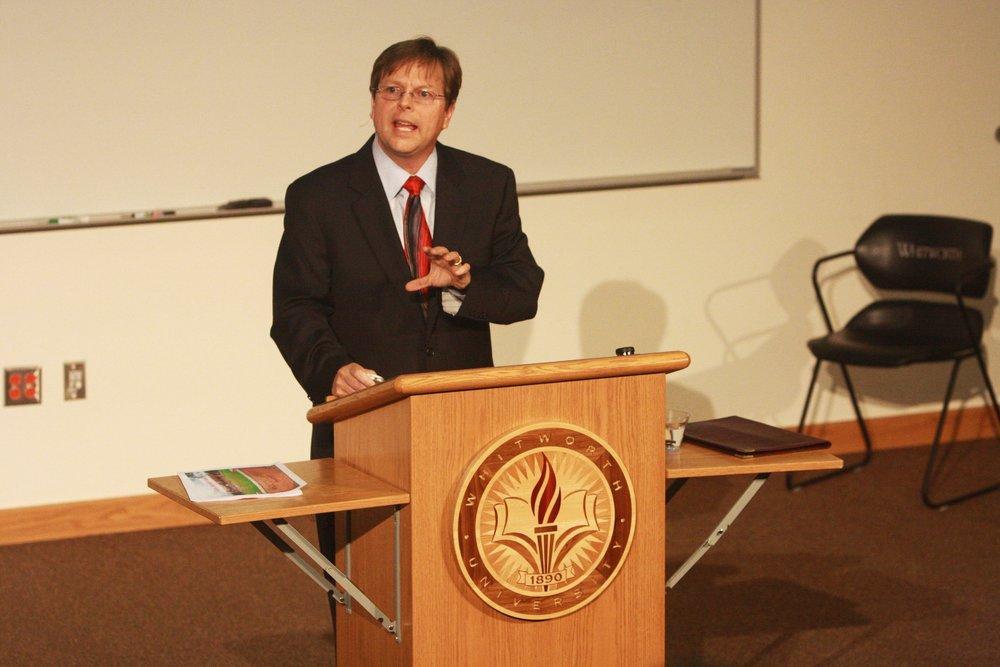Constitution Day, Sept. 17, marked the 226th anniversary of the Constitution signing. To celebrate, Whitworth hosted a lecture, “Guns, Marriage and Corporation: How the Supreme Court is Approaching Today’s Critical Constitutional Issues,” led by Whitworth alumnus and attorney-at-law Breean Beggs.
During the lecture, Beggs explained the processes of legally creating change in the United States. Beggs specializes in employment discrimination, wrongful death and civil rights violations. He was previously the executive director of the nonprofit Center for Justice in Spokane.
The recent Supreme Court cases on the topics of gun control, same-sex marriage and the influence of corporations in politics, policy and law were addressed in his lecture as well.
A law passed in 2004 requires schools that receive federal funding, such as Whitworth, to recognize and discuss the Constitution on Constitution Day. Beggs said he finds the requirement ironic considering the spirit of the Constitution.

“I think that there should be a focus on important legal documentation like the Constitution, but it’s ironic because the Constitution is about freedoms,” Beggs said.
It is still important to recognize days such as Constitution Day, Beggs said, because when American citizens want change in this country, many of them do not understand the rules or processes to make such changes.
The inspiration for the Constitution Day lecture came from the great deal of publicity the media gives these issues, Beggs said.
“People in the audience would actually be attracted to these really interesting examples on how the courts could apply the language of the Constitution to these issues,” Beggs said. “Whitworth, in particular, has struggled with how to come to grips with same gender marriage.”
The lecture was about processes rather than personal opinions, Beggs said.
“It’s not the words that are exceptional; what is exceptional is the idea that people could come together and rationally figure out how to live together,” Beggs said.
Around 50 people, a mix of students and faculty, attended the seminar held in Weyerhaeuser Hall.
“I don’t think it’s necessary, but I think it’s important for citizens to learn about the Constitution,” freshman Amy Ferris said.
The Second Amendment, which protects the right to bear arms, was one of the amendments on which Beggs focused.
“You cannot tell people that they cannot keep a gun in their house to protect themselves in a dangerous city,” Beggs said.
Beggs said that regulations were fine — no guns in schools, no criminals allowed to have arms — but you cannot mess with people’s guns in their homes. Outside the home, they are free to regulate, he said.
Laws and regulations not only interfere with gun rights, but with other personal rights, such as same-sex marriage, Beggs said.
“I don’t think that it’s [same-sex marriage] much different from race issues,” Beggs said.
Same-sex marriage is legal in Washington State, although it is illegal in 37 states. Beggs referenced the case United States v Windsor, in which the U.S. Supreme Court found that the Defense of Marriage Act (DOMA), a law that refused to recognize same-sex marriage, was unconstitutional.
The Supreme Court found that DOMA was a “deprivation of the equal liberty of persons that is protected by the Fifth Amendment,” according to the Supreme Court.
Even though the federal government can now recognize same-sex marriage, many states do not have laws permitting it, which is something that Beggs finds troubling, he said.
Marriage is a fundamental right, but fundamental rights only extend so far and to natural citizens, Beggs said.
“Corporations are clearly not free people, so they do not have the same constitutional rights as free people,” Beggs said. “I think that special interest groups are a way that we organize people and bring a marketplace of ideas. They are a great way to communicate and educate. But natural people are more important when compared to the rights of these groups.”
It is important to try to keep the rights of groups and corporations separate from rights of natural people, Beggs said.
“I love the idea of celebrating Constitution Day. I think it’s a great opportunity to take the time and educate people on a different subject each year,” sophomore Aubrey Rogers said. “It isn’t a situation where we can help by doing anything I guess unless you have a strong opinion about the matter one way or another.”
The Supreme Court makes these important decisions so it has very little to do with voters, Rogers said.
“Our law is no better than we the people and is just as inconsistent,” Beggs said.
And for those interested in pursuing a career in law?
“Spend time with lawyers and get an internship for a while because ideas of what a lawyer is often is from TV or movies, which are very unrealistic,” Beggs said. “Find a passion and match law up to it. You tend to be happy when you can connect law to life.”
Contact Shelby Harding at sharding15@my.whitworth.edu









 Spokane?
Spokane?